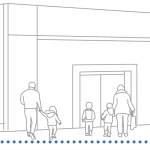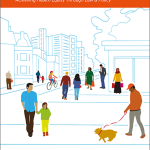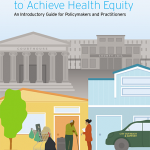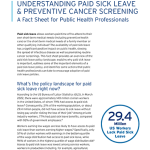Employment Laws
Episode 2: Policy solutions for equitable enforcement of employment laws
What laws and policies affect low-income workers?
How does inequitable enforcement of laws intended to protect these workers exacerbate inequities?
Policy Solutions for Equitable Enforcement of Employment Laws explores innovations and trends in policy development in the employment sector. In Episode 2 of our virtual discussion series Uprooting the Structural Drivers of Health Inequities, panelists discuss the enforcement landscape, structural racism, and paid leave.
Expert Panel
- Maya Hazarika Watts, senior attorney at ChangeLab Solutions (moderator)
- Ruqaiijah Yearby, professor of law at Saint Louis University School of Law and co-founder of the Institute for Healing Justice and Equity
- Jared Make, vice president of A Better Balance
- LiJia Gong, counsel at Public Rights Project
Highlights
Our panelists reflect on how to shape a more inclusive policy agenda as we move into post-pandemic economic recovery.
The pandemic has put a spotlight on glaring gaps in law and labor policy that existed before COVID-19, and it has led to new opportunities to address them. This includes preemption. Many states have not only not created labor standards or worker health and safety standards, but they’ve actively prevented localities from doing so. ―Jared Make
Law and policy: There's a significant gap between the promise of our laws and people's lived experiences today. This gap exists in part because laws and policies designed to keep us healthy are not enforced in a way that promotes health for the most marginalized communities. ―Maya Hazarika Watts
Health justice framework: In order to correct the inequities we’ve seen during COVID-19, we need to adopt a health justice framework, particularly in relation to policymaking. The first prong of this approach is to address structural discrimination. If we’re thinking about paid sick leave as we did under COVID economic relief bills, we can’t leave gaps; we must cover essential workers. If we want to redress prior harms and also encourage people to stay home, we have to provide financial supports and accommodations. We need to integrate the systems of public health, employment, enforcement, and support for workers. ―Ruqaiijah Yearby
Building resilience: One thing I think about is building our resilience for future crises. Community resilience involves how we treat minimum standards for workers. We need to think about resilience in a broader way than we’ve thought of it before. ―LiJia Gong
Preemption: The pandemic has put a spotlight on glaring gaps in law and labor policy that existed before COVID-19, and it has led to new opportunities to address them. This includes preemption. Many states have not only not created labor standards or worker health and safety standards, but they’ve actively prevented localities from doing so. ―Jared Make
What is possible in policy might be beyond what we imagined before the pandemic — for example, an eviction moratorium. I want to take that into our future work with great intention, so we aren’t limiting what resilient systems are possible by not asking for enough. ―LiJia Gong
Lessons from the pandemic: What is possible in policy might be beyond what we imagined before the pandemic — for example, an eviction moratorium. I want to take that into our future work with great intention, so we aren’t limiting what resilient systems are possible by not asking for enough. ―LiJia Gong
Watch a recording of episode 2:




